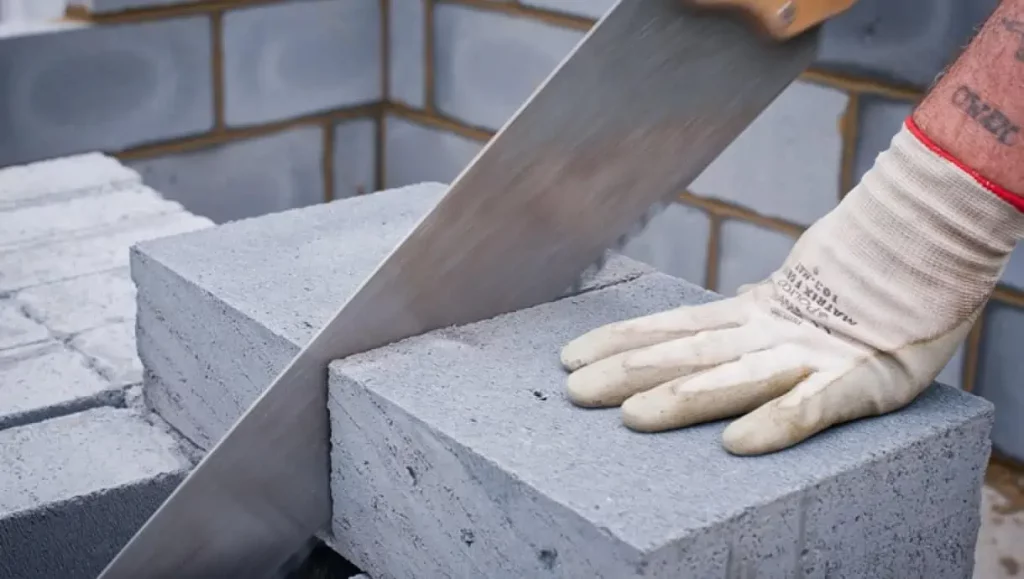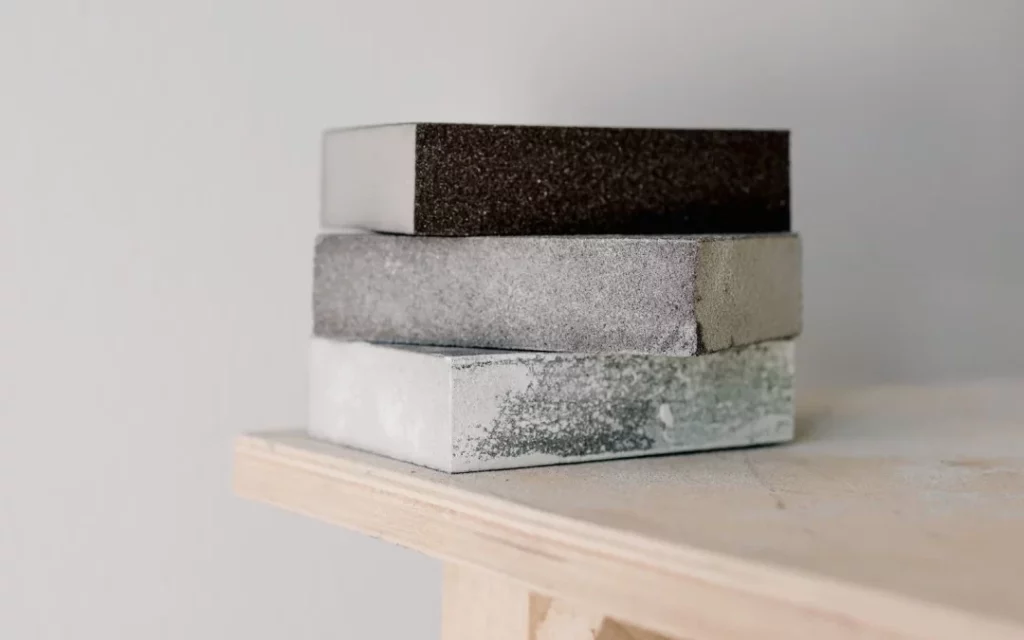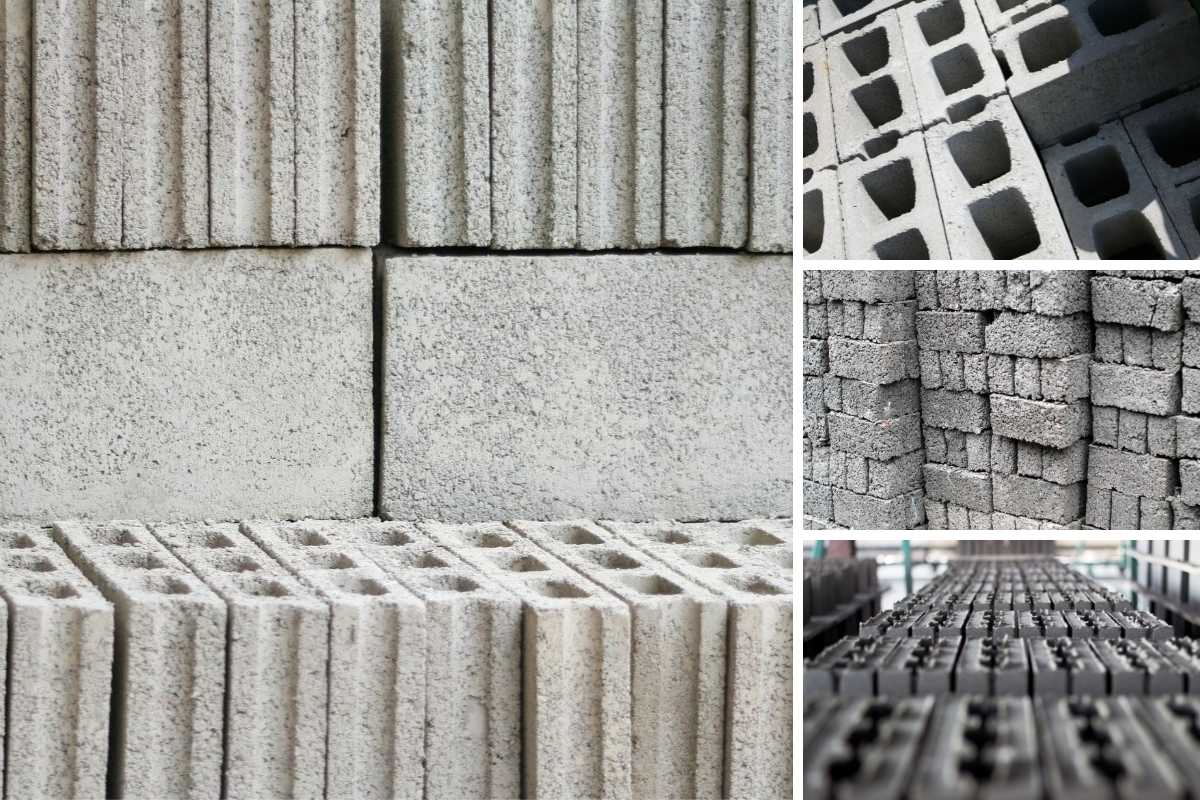Thermalite blocks and concrete blocks are both building materials with distinct characteristics:
Thermalite Blocks:
- Offer good thermal insulation.
- Lightweight and easy to cut.
- Provide sound insulation and moisture resistance.
- Moderate fire resistance.
Concrete Blocks:
- Known for strength and durability.
- Versatile in size and application.
- Cost-effective option.
- Offer sound insulation and higher fire resistance.
Choosing between them depends on your project’s needs:
- Thermalite blocks for insulation and energy efficiency.
- Concrete blocks for structural strength and versatility.
- Consult professionals for personalized advice based on your project requirements.
What Is The Difference between Thermalite and Concrete Blocks?

Here is the difference between Thermalite and Concrete Blocks :
Thermal Performance
Insulation Efficiency of Thermalite Blocks :
Thermalite blocks excel in thermal insulation due to their porous structure and trapped air pockets.
Moreover, this design significantly reduces heat transfer through the blocks, leading to better energy efficiency, reduced reliance on heating and cooling systems, and improved occupant comfort.
Thermal Conductivity of Concrete Blocks :
Concrete blocks have higher thermal conductivity compared to thermalite blocks due to their denser composition.
Additionally, this means that they conduct heat more readily, leading to a greater potential for temperature fluctuations and higher energy consumption.
Structural Strength
Load-Bearing Capacity of Thermalite Blocks
While thermalite blocks possess good structural integrity, their load-bearing capacity may be lower than that of concrete blocks.
In addition, this makes them more suitable for non-load-bearing or less heavily loaded sections of a building, such as interior partition walls.
Strength and Load Distribution of Concrete Blocks
Concrete blocks are renowned for their exceptional load-bearing capabilities and strength. Moreover, they are commonly used in load-bearing walls and other structural elements where high strength and durability are essential to withstand the forces exerted on the building.
Fire Resistance
Fire Safety of Thermalite Blocks
Thermalite blocks offer good fire resistance due to their composition, particularly the inclusion of non-combustible materials.
Additionally, the air pockets within thermalite blocks contribute to their ability to resist heat transfer during a fire, giving occupants more time to evacuate.
Fire Ratings for Concrete Blocks
Concrete blocks exhibit excellent fire resistance as well, owing to their dense nature.
Moreover, they can withstand high temperatures and help contain the spread of flames, making them a reliable choice for fire-resistant construction.
Acoustic Properties
Sound Insulation in Thermalite Blocks
Thermalite blocks have superior sound insulation properties compared to concrete blocks. However, the porous structure of thermalite blocks helps absorb and dampen sound waves, contributing to quieter indoor environments.
Sound Transmission Characteristics of Concrete Blocks
Concrete blocks provide some sound insulation due to their density, but they are not as effective as thermalite blocks in this regard. In addition, acoustic treatments may be required to achieve desired levels of soundproofing.
Cost Analysis
Initial Costs of Thermalite Blocks
Thermalite blocks tend to have higher initial costs than concrete blocks due to their manufacturing process and insulation properties. However, these costs may be offset by long-term energy savings.
Comparative Cost of Concrete Blocks
Concrete blocks are generally more affordable upfront compared to thermalite blocks.
In addition, their cost-effectiveness makes them a popular choice for many construction projects, especially when budget constraints are a primary concern.
Environmental Considerations
Sustainability of Thermalite Blocks
Thermalite blocks can be considered more environmentally friendly than traditional concrete blocks due to their lower density and reduced energy consumption over the building’s lifecycle.
However, the manufacturing process and sourcing of raw materials should still be evaluated for sustainability.
Environmental Impact of Concrete Blocks
Concrete blocks have a higher environmental impact compared to thermalite blocks due to the energy-intensive manufacturing process and the extraction of raw materials. Their weight can also contribute to higher transportation costs and emissions.
What Are The Thermalite Blocks?

Thermalite blocks, also known as aerated concrete or autoclaved aerated concrete (AAC) blocks, are lightweight and porous building materials made from a combination of sand, cement, lime, and aluminum powder.
Moreover, during the manufacturing process, the mixture is aerated, which forms numerous tiny air pockets within the material.
In addition, these air pockets contribute to its lightweight nature and provide thermal insulation properties.
Properties and Characteristics
Thermal Insulation Capabilities
Thermalite blocks are renowned for their exceptional thermal insulation properties. The network of air pockets within the blocks creates a barrier against heat transfer.
However, this results in improved energy efficiency in buildings, as they help maintain a more stable indoor temperature, reducing the need for excessive heating or cooling.
Lightweight Nature
Thermalite blocks are significantly lighter than traditional concrete blocks. Their low density makes them easier to handle, transport, and install.
Additionally, this lightweight characteristic minimizes the load on the overall structure, which can be particularly advantageous in multi-story buildings.
Fire Resistance
Thermalite blocks offer commendable fire resistance due to the incorporation of non-combustible materials in their composition.
In addition, the air pockets within the blocks create an insulating effect, reducing the transfer of heat during a fire.
Moreover, this can provide occupants with more time to evacuate and can limit the spread of flames within the building.
Sound Insulation
The porous structure of thermalite blocks also contributes to their sound insulation capabilities. The air pockets help absorb and dampen sound vibrations, thereby enhancing acoustic comfort within buildings.
Additionally, this is especially valuable in applications where noise reduction is crucial, such as residential units located near busy roads.
Thermalite blocks Advantages
Energy Efficiency: Thermalite blocks significantly contribute to energy efficiency in buildings. However, their high thermal resistance lowers the need for artificial heating or cooling, resulting in reduced energy consumption and lower utility bills.
Reduced Structural Load: The lightweight nature of thermalite blocks places less stress on the building’s foundation and structural components. In addition, this advantage can lead to cost savings in foundation construction and structural support systems.
Faster Construction: Due to their larger size and lightweight properties, thermalite blocks can expedite the construction process. Moreover, their ease of handling and faster installation can lead to shorter project timelines.
Enhanced Acoustic Properties: Thermalite blocks’ ability to absorb sound waves and vibrations contributes to quieter indoor environments, making them particularly suitable for buildings located in noisy urban areas.
Thermalite blocks disadvantages
Higher Cost Compared to Concrete Blocks
Thermalite blocks tend to be more expensive than traditional concrete blocks due to the additional manufacturing processes and specialized materials involved. This cost factor can influence budget considerations.
Limited Load-Bearing Capacity for Certain Applications
While thermalite blocks are structurally sound, they may have limitations in extremely heavy load-bearing applications.
Engineers need to carefully consider and design for such scenarios to ensure the safety and stability of the structure.
Vulnerability to Impact Damage
The lightweight and porous nature of thermalite blocks can make them more susceptible to impact damage compared to denser materials like concrete.
Protective measures might be required in areas with a higher risk of impact.
What Are The Concrete Blocks?
Concrete blocks, also known as concrete masonry units (CMUs), are solid building components made from a mixture of cement, aggregates (such as sand or gravel), and water. Moreover, the mixture is formed into block shapes and cured to achieve the desired strength and durability.
Properties and Characteristics :
Strength and Durability :
Concrete blocks are known for their robust structural strength and durability.Moreover, they can withstand heavy loads and provide a solid foundation for various construction applications, including load-bearing walls and foundation walls.
Weight and Structural Integrity :
Due to their solid composition, concrete blocks are heavier compared to lightweight alternatives like thermalite blocks.
In addition, this weight contributes to their structural integrity, making them suitable for projects requiring higher load-bearing capabilities.
Thermal Properties :
Concrete blocks have lower thermal insulation properties compared to materials like thermalite blocks. Moreover, they conduct heat more readily.
Which can result in increased heat transfer between indoor and outdoor environments. Additional insulation measures are often needed to enhance energy efficiency.
Fire Resistance and Safety :
Concrete blocks exhibit excellent fire resistance due to their dense composition. They can withstand high temperatures and provide a barrier against the spread of flames and heat, contributing to the overall safety of structures.
Advantages
Affordability
Concrete blocks are generally more cost-effective than specialized materials like thermalite blocks. This affordability makes them a preferred choice for a wide range of construction projects.
High Load-Bearing Capacity
The solid and heavy nature of concrete blocks gives them superior load-bearing capabilities, making them suitable for constructing walls, foundations, and other structural elements in both residential and commercial buildings.
Versatility in Construction
Concrete blocks are highly versatile and can be used in various applications, from load-bearing walls to decorative facades. In addition, they come in different sizes, shapes, and finishes, providing flexibility in design and construction.
Ease of Installation and Finishing
Concrete blocks are relatively straightforward to install, as they can be easily stacked and mortared together. Their consistent shape and size simplify the construction process. Additionally, they can be finished with various surface treatments for aesthetic purposes.
Disadvantages
Lower Thermal Insulation
One of the main drawbacks of concrete blocks is their lower thermal insulation properties compared to other building materials like thermalite blocks. This can lead to higher energy consumption for heating and cooling, especially in extreme climates.
Heavier Weight May Require More Foundation Support
The weight of concrete blocks can necessitate more substantial foundation support. Additionally, this may lead to increased construction costs and engineering considerations, especially in areas with challenging soil conditions.
Limited Soundproofing Capabilities
While concrete blocks have some inherent soundproofing qualities due to their density, moreover, they are not as effective as materials with greater sound-absorbing properties.
Additional soundproofing measures may be needed in certain applications.
FAQ’s
Are Thermalite blocks strong?
Thermalite blocks are known for their lightweight and insulating properties, but their strength can vary based on the specific type and density of the block.
Generally, they are not as strong as traditional concrete blocks, making them suitable for non-load-bearing walls or partitions.
What are Thermalite blocks for?
Thermalite blocks are primarily used for insulation and partitioning in construction projects. They are often employed in interior walls, cavity walls, and other applications where thermal and acoustic insulation are important.
Are Thermalite blocks concrete?
While Thermalite blocks share some similarities with concrete blocks, they are not the same. Thermalite blocks are made from a mixture of cement, lime, and pulverized fuel ash, which undergoes a heating process to create a porous structure.
Which block is best for construction?
The choice of block for construction depends on the specific requirements of the project. Concrete blocks are strong and commonly used for load-bearing walls, while Thermalite blocks excel in providing insulation.
Other options like AAC blocks offer good strength and thermal properties. The best choice varies based on factors such as structural needs, insulation requirements, and local building codes.
How strong is Thermalite?
The strength of Thermalite blocks varies based on their density. While they might not be as strong as concrete blocks, they are designed to withstand the loads they typically encounter in non-load-bearing applications like partition walls.
Conclusion
In conclusion, the comparison of thermalite vs concrete blocks reveals a range of factors that influence their suitability for different construction projects.
Both materials offer distinct advantages and limitations, making the selection process dependent on project requirements, budget considerations, and long-term goals.
Throughout this analysis, it becomes evident that thermalite blocks excel in thermal insulation and energy efficiency due to their lightweight composition and enhanced R-value.
Moreover, they are particularly well-suited for projects prioritizing energy conservation and reduced heat loss. However, their higher initial cost and limited structural applications should be carefully evaluated.
On the other hand, concrete blocks showcase exceptional strength, durability, and affordability, making them suitable for a wide range of construction scenarios.











